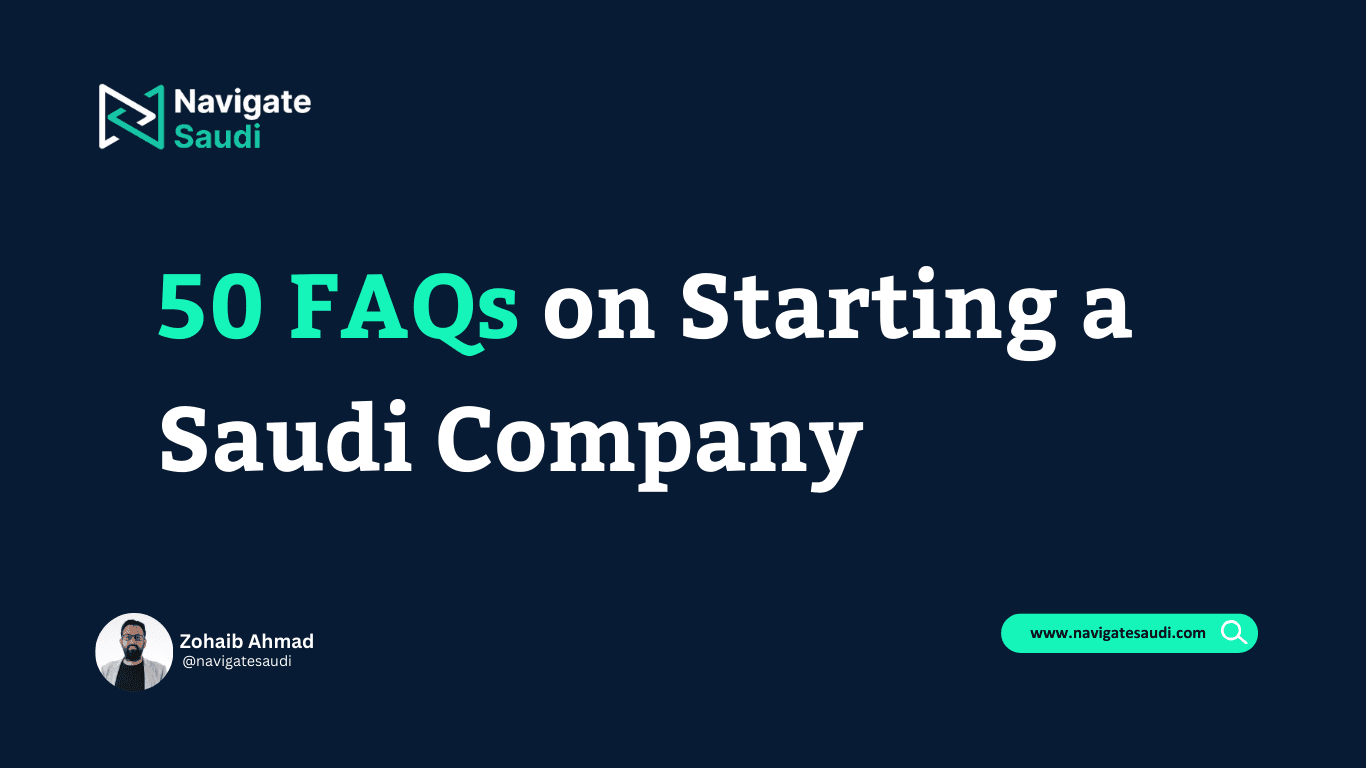50 FAQs on Starting a Saudi Company
Nov 18, 2024
Q1: How long does it typically take to establish a business in Saudi Arabia?
A: The setup process usually takes between 1 to 3 months, depending on the type of business and the documents required.
Q2: What types of business structures are available for foreign entrepreneurs?
A: The common structures are:
1️⃣ Limited Liability Company (LLC)
2️⃣ Branch of a Foreign Company
3️⃣ Joint Stock Company (JSC)
Each has different requirements and benefits.
Q3: Do I need a Saudi partner to start a business in Saudi Arabia?
A: Not always! Many industries allow 100% foreign ownership, especially for startups under MISA’s Entrepreneur License.
Q4: What is the difference between an LLC and a Branch of a Foreign Company?
A: An LLC is an independent entity with limited liability. A branch directly represents the parent company and must follow additional compliance rules.
Q5: Is 100% foreign ownership allowed in Saudi Arabia?
A: Yes. The Ministry of Investment allows full foreign ownership in various industries, especially under the entrepreneur and foreign investor licenses.
Q6: How do I choose the right legal structure for my business in Saudi Arabia?
A: Consider factors like liability, control, industry restrictions, and future expansion. An LLC is popular for limited liability, while branches are better for brand extension.
Q7: Are there any industries or sectors restricted to foreign investment?
A: Yes, some sectors are reserved for local investment, like oil exploration, military etc.
Q8: What are the requirements for registering a branch of a foreign company?
A: Requirements include:
1️⃣ Last 1-Year Audited Financial Statement
2️⃣ Certificate of Incorporation
3️⃣ Memorandum of Association
4️⃣ Board Resolutions to Open the Branch
5️⃣ Power of Attorney for a Local Consultant
All above documents should be Apostille. For countries not part of the Hague Convention, documents need to be notarized, stamped by the Ministry of Foreign Affairs, and attested by the Saudi Embassy in the parent company’s country.
Q9: What is the process for reserving a trade name?
A: Currently, the trade name can only be booked by a Saudi National. Your consultants on the ground will book the name for you. The Trade Name should be:
In Arabic
Have a meaning in Arabic
Not include country/city names
In some cases, the same Foreign Company name can be booked by your consultants.
Q10: What types of licenses are available for foreign-owned businesses?
A: Key licenses include:
1️⃣ Service License. Example: IT, Tourism, Restaurants etc
2️⃣ Industrial License. Example: Factory, Workshop
3️⃣ Trading/Commercial License. Example: Import/Export, Retail Shop
Each license has unique benefits and requirements.
Q11: Can I apply for an Entrepreneur License, and what are the requirements?
A: The Entrepreneur License is for startups with or without a foreign parent company. To get this license, your startup must receive a recommendation letter from an Approved Incubator/Accelerator/VC by the Ministry of Investment (MISA).
Q12: Do I need separate licenses for each business activity?
A: Yes, if you operate in multiple industries. Each activity may require specific licenses and approvals. For example, a service license won’t cover trading or factory operations.
Q13: Is there a minimum capital requirement for foreign businesses?
A: Most businesses do not require a minimum capital requirement. Startups can begin with as little as SAR 5,000.
Q14: What taxes and fees are applicable to foreign-owned companies in Saudi Arabia?
A:
Corporate Tax & Zakat: 20% corporate tax on adjusted annual profits.
VAT: 15% on goods/services if the revenue exceeds SAR 375,000.
Withholding Tax: Ranges between 5% and 20% for payments to foreign entities.
Q15: Can I open a bank account before my company is fully registered?
A: No, a CR and MISA license are required before opening a business bank account.
Q16: What documents are required for opening a bank account?
A:
1️⃣ CR (Arabic & English)
2️⃣ MISA Digital License
3️⃣ Articles of Association (AOA)
4️⃣ Activities List (Arabic & English)
5️⃣ Company National Address
6️⃣ Owner’s/Partners’ Iqama ID
7️⃣ Owner’s/Partners’ Passport ID
8️⃣ Owner’s/Partners’ National Address
9️⃣ Company Stamp with CR Number (required by some banks)
Some banks allow to open the bank account online. Read more from this article
Q17: Are there any restrictions on transferring profits or funds abroad?
A: There are no significant restrictions, but tax obligations must be settled before transferring profits.
Q18: What are the costs associated with hiring employees in Saudi Arabia?
A: Costs include:
Visa fees
Medical insurance
Ministry of Labor fees (SAR 9,600 per expat)
Employee salary packages
Q19: What visas are available for foreign entrepreneurs and employees?
A: Visas available :
General Manager (GM) Visa
CEO/Chairman Visa for business owners
Work visas for employees
Q20: How do I obtain a General Manager (GM) visa?
A: After securing your MISA license and CR, apply for a GM visa through the MISA portal. Required documents include passport details, CR, and proof of employment.
Q21: What are the requirements for bringing foreign employees to Saudi Arabia?
A: Requirements include a valid work visa, medical insurance, and compliance with Ministry of Labor regulations. An active company CR is also essential.
Q22: Can the company sponsor visas for foreign employees?
A: Yes, companies sponsor visas as a standard practice for foreign employees. Sponsorship is required to issue an Iqama (residency permit).
Q23: What is the Iqama, and how do I apply for it?
A: The Iqama is a residency permit for foreign workers in Saudi Arabia. Applications are made via the Qiwa and Muqeem Portals after completing medical tests, insurance, and fee payments.
Q24: How long does it take to obtain an Iqama for foreign employees?
A: Typically, it takes 1 week after the employee’s arrival in Saudi Arabia, provided all documents and medical tests are complete.
Q25: What is the process for renewing work visas and Iqamas?
A: Renewals are processed through the Qiwa and Muqeem portals. Ensure all documents, medical tests, and applicable fees are updated before renewal.
Q26: Are there any specific healthcare requirements for obtaining an Iqama?
A: Employees must complete a medical examination, including health checks and communicable disease tests, both in their home country and upon arrival in Saudi Arabia.
Q27: What is Saudization (Nitaqat)?
A: Saudization (Nitaqat) is a government initiative requiring companies to hire a certain percentage of Saudi nationals to increase employment opportunities for locals.
Q28: How are companies categorized under Nitaqat?
A: Companies are classified into Platinum, Green, Yellow, and Red categories based on their compliance with Saudization requirements.
Q29: What are the Saudization percentages for each category?
A: The required percentage varies by industry, company size, and activity. Platinum and Green indicate compliance, while Yellow and Red indicate non-compliance.
Q30: What happens if my company does not meet Saudization requirements?
A: Non-compliant companies may face penalties such as:
Restrictions on renewing work visas.
Inability to issue new visas.
Delays or suspension of business operations.
Q31: How are part-time Saudi employees counted in Saudization?
A: Part-time Saudi employees are counted as 50% of a full-time Saudi employee for Saudization calculations.
Q32: Do employees with disabilities count toward Saudization?
A: Yes, each employee with a disability counts as four Saudi employees, provided they are employed full-time.
Q33: What are the penalties for non-compliance with Saudization?
A: Non-compliance may result in fines, restrictions on visa issuance or renewal, and potential legal actions.
Q34: What are the benefits of being in the Platinum or Green category under Saudization?
A: Companies in these categories enjoy:
Faster government services.
Easier visa issuance.
Ability to hire expatriates from lower-ranked companies.
Q35: What is the minimum Salary to hire a Saudi Employee?
A: Minimum salary for each Saudi Employee should be SAR 4000.
Q36: What support is available for foreign companies to meet Saudization requirements?
A: Support includes:
Wage subsidies from the HRDF (Human Resources Development Fund).
Access to Taqat and Tamheer platforms for recruitment.
Training and upskilling programs for Saudi employees.
Q37: How can I improve my company’s Saudization category?
A: Steps to improve your Saudization status include:
Hiring Saudi nationals through Qiwa or Taqat platforms.
Offering flexible work arrangements.
Investing in training and development for Saudi employees.
Q38: Is medical insurance mandatory for foreign employees?
A: Yes, medical insurance is required for all foreign employees and is essential for obtaining the Iqama.
Q39: What is the penalty for non-compliance with local regulations?
A: Penalties vary depending on the type of violation and may include:
Fines.
Suspension or revocation of licenses.
Restrictions on business operations.
Q40: What compliance requirements must I meet as a foreign business?
A: Compliance requirements include:
Maintaining valid licenses.
Adhering to tax laws.
Following Saudi labor regulations, including Saudization.
Q41: How do I register for VAT, and when is it required?
A: VAT registration is required if annual turnover exceeds SAR 375,000. Register through the ZATCA portal and submit quarterly returns.
Q42: Are there mandatory audit requirements for foreign businesses?
A: Yes, annual financial audits are required for all foreign businesses.
Q43: Can I open multiple companies?
A: Yes, as a foreign investor, you are allowed to open multiple companies. Opening of another company will again require to complete company formation steps.
Q44: Can I operate a virtual office in Saudi Arabia, or do I need a physical presence?
A: A physical office is mandatory for most licenses. Co-working spaces can provide a physical address for registration purposes.
Q45: What intellectual property protections are available in Saudi Arabia?
A: The Saudi Authority for Intellectual Property allows businesses to register trademarks, patents, and copyrights to protect their intellectual property.
Q46: What is the process for closing or dissolving a business in Saudi Arabia?
A: To close a business, you must:
Submit a closure request to MISA.
Cancel licenses.
Settle outstanding debts.
Notify relevant authorities.
The process may take several months.
Q47: Can I change the legal structure of my business after registration?
A: Yes, you can change the legal structure (e.g., from a branch to an LLC) by applying through the Ministry of Commerce and MISA. Additional documentation and approvals may be required depending on the change.
Q48. Can I conduct e-commerce activities under my business license?
A: Yes, you can conduct e-commerce activities, but your business license must explicitly list e-commerce as an approved activity. Additional e-commerce registration with platforms like Maroof may also be required.
Q49. Are there any restrictions on foreign ownership of real estate in Saudi Arabia?
A: Foreign companies can own property in Saudi Arabia if it is directly linked to their business operations. Approval from relevant authorities is required for purchasing commercial or industrial property.
Q50. What are the common challenges foreign startups face in Saudi Arabia?
A: Common challenges include understanding local regulations, navigating language barriers, meeting Saudization quotas, and adapting to cultural and business norms. Working with local consultants can help mitigate these issues.
At Navigate Saudi, we strive to provide you with the most accurate and up-to-date information on setting up your company in Saudi Arabia. If you have any suggestions for corrections or updates, feel free to contact us at setup@navigatesaudi.com.
Join Our Community
Have more questions or want regular updates on setting up your business in Saudi Arabia?
👉 Join our WhatsApp community to stay updated and get answers to your questions directly.
We’re here to support you every step of the way! 🚀

